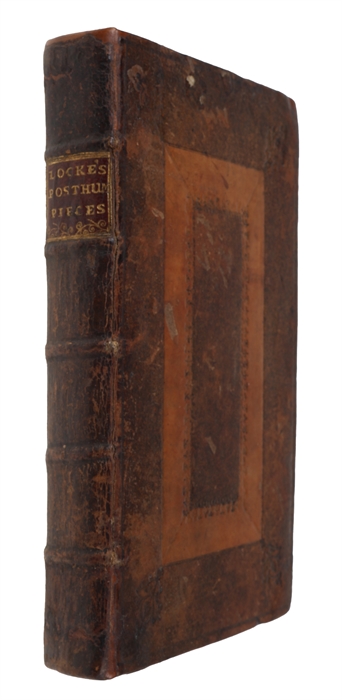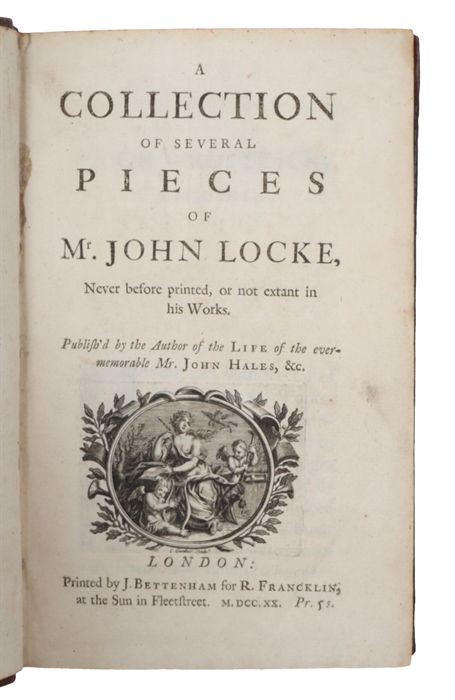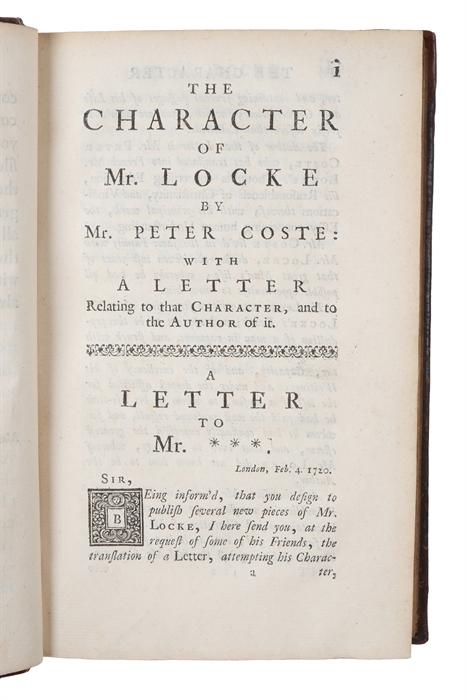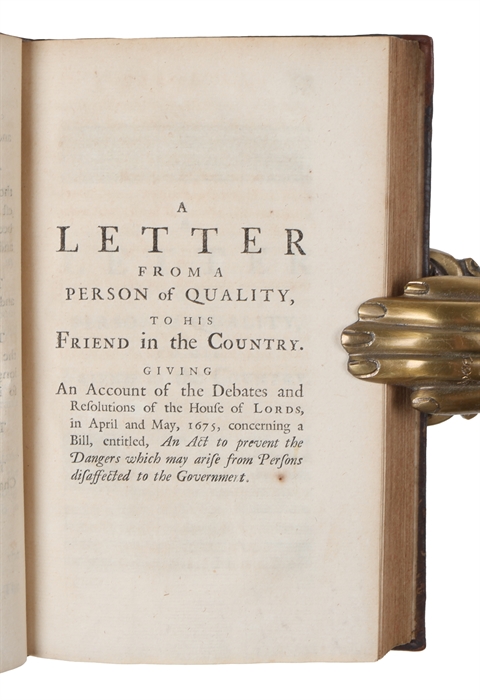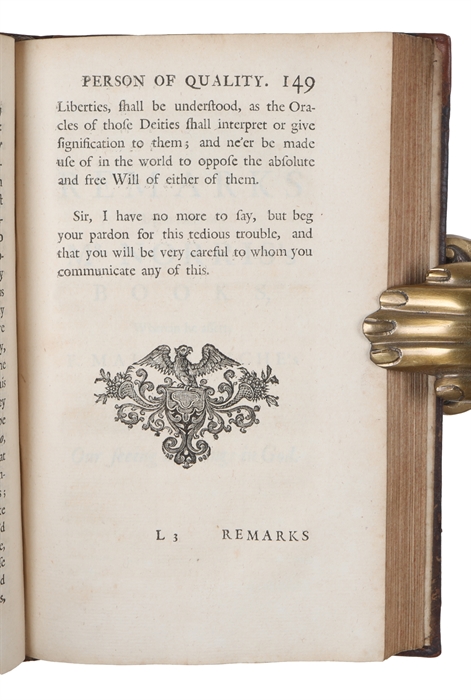LOCKE'S MAIN WORK ON NATURAL PHILOSOPHY
LOCKE, JOHN.
A Collection of Several Pieces. Never before printed, or not Extant in his Works. Publish'd by the Author of Life of the evermemorable Mr. John Hales, &c.
London, J. Bettenham, 1720.
8vo. Nice contemporary English Cambridge-style full calf binding with five raised bands and gilt title-label to spine. Neat minor repair to extremities. A bit of overall wear, but a nice and tight copy. Internally nice and clean with only some occasional soiling that is very light. Engraved title-vignette (36 - i.e. title-page + dedication), XXIV (i.e. "The Character of Mr. Locke" by Peter Coste), (2 - i.e. contents), 362, (18 - i.e. index), (4 - i.e. errata + advertisements) pp. + one plate ("The Solar System").
First edition of this important collection of hitherto unpublished works by Locke, containing the first printing of his unique work on Natural philosophy "The Elements of Natural Philosophy" as well as first printings of other important works.
Assisted by Anthony Collins, in 1720 the journalist Pierre Desmaizeaux brought out a new collection of Works and pieces by John Locke that had not previously been published. This collection, "A Collection of Several Pieces", came to play a great role in the Locke scholarship, not least in recent times, and not least because it contains the first printing of his "Elements of Natural Philosophy"
The "Elements of Natural Philosophy" constitutes Locke's main work in natural philosophy, and it is a work that pas puzzled Locke scholars and readers ever since its appearance. The work seems to need some further explanation; at a firsthand glance it doesn't look very much like Locke - the greatest of the English philosophers who has so frequently been accused of not understanding the exact sciences and who even encouraged the youth not to learn these but to educate themselves in superficial and useful party-conversation. Thus, numerous attempts have been made to establish the influence that resulted in this educational work of natural science. The two dominating answers to the question of influence are now: Newton and Descartes. It now seems to be fairly commonly recognized that Newton, a personal friend of Locke, even contributed directly to the work. "When Locke himself at the end of his life came to compose a treatise on natural philosophy for a pupil, we have reason to believe that he obtained the advice and help of the most brilliant scientist of the century, his close friend Isaac Newton. As we shall see, this unique educational work itself, "The Elements of Natural Philosophy", belies the myth of Locke the scientific smatterer." (Axtell, Locke, Newton, and the Elements of Natural Philosophy, p. 244). However, Descartes influence also seems to be obvious; "The influence of the "Principles" (by Descartes) is also obvious in Locke's posthumously published "Elements of Natural Philosophy". There is a striking similarity in the order of exposition, although there are also considerable differences: Locke carefully eschewed Descartes' "a priori" metahpysics of nature... We find him rather emphasizing the essential role of experience. For example, Locke introduced Newtonian universal gravitation as follows:... Thus, according to Locke empirical support was necessary to establish the law of nature. Although the exposition looks quite similar to Descartes' "Principles", the "Elements" in fact contain several anti-Cartesian remarks in favour of the experimental philosophy." (Aoki, Descartes and Locke on the Nature of Matter. In: Hutton and Schuurmann edt., Studies on Locke, p. 77).
"Elements of Natural Philosophy" was printed in no less than nine times during the 1th century and appeared in both Russian and French during the 18th century as well.
The present "Collection of several Pieces" furthermore included a collection of letters from Locke to Anthony Collins, "Remarks upon some of Mr. Norris's Books...", "Some Thoughts concerning Reading and Study for a Gentleman...", and "Rules of a society...", all printed here for the first time, as well as an English translation of Coste's Eulogy ("The Character of Mr. Locke", originally published in French in 1705), and reprints of "The fundamental Constitutions of Carolina" and "A Letter from a person of Quality...".
"Remarks upon some of Mr. Norris's books..." is the third of Locke's replies to Norris.
"Some thoughts concerning reading and study for a gentleman" constitutes Locke's reply to Samuel Bold's question, on behalf of a parishioner, on how to create a course of reading and study.
"Rules of a Society" constitutes the rules that Locke set up for a small group of friends who met once a week to discuss "useful Knowledge" and to promote "Truth and Christian Charity". Throughout his life Locke created several of these "societies", one of which led to his "An Essay Concerning Human Understanding", another one being "The College" in London after the Revolution.
Order-nr.: 41467

